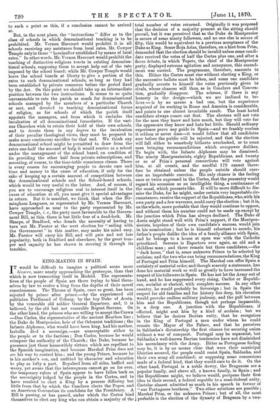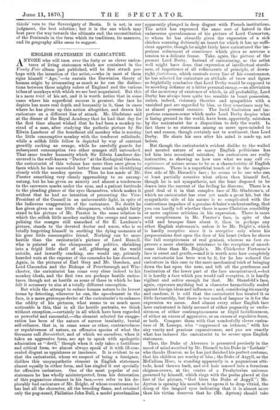KING-MAKING IN SPAIN.
IT would be difficult to imagine a political scene more bizarre, more nearly approaching the grotesque, than that which is now transacting itself in Madrid. The representa- tives of the people of Spain are there trying to bind them- selves by law to evolve a king from the depths of their moral consciousness. The Throne of Spain, once so great, has been rejected by prince after prince,—by the experienced old politician Ferdinand of Coburg, by the boy Duke of Aosta, by the venerable old soldier General Espartero, and, it is believed, by the old but not venerable Regent Serrano. On the other hand, the princes who are willing to accept the Crown —Don Carlos, the representative of the ancient Bourbon line ; the Duke de Montpensier, heir of the Orleanist traditions ; the Infante Alphonso, who would have been king, had his mother, Isabella died a sovereign,—are unacceptable either to the people or to the factions ; Don Carlos, because he would reimpose the authority of the Church ; the Duke, because he possesses just those housewifely virtues which are repellant to the Spanish imagination, and because Marshal Prim does not see his way to control him ; and the young Prince, because he is his mother's son, and unfitted by character and education to play so lofty a part. Repulsed from all sides, baffled and weary, yet aware that the interregnum cannot go on for ever, the temporary rulers of Spain appear to have fallen back on the sovereignty lodged by the people in the Cortes, and to have resolved to elect a King by a process differing but little from that by which the Conclave elects the Popes, and an American Convention its candidate for the Presidency. A Bill is passing, or has passed, under which the Cortes bind themselves to elect any king who can obtain a majority of the total number of votes returned. Originally it was proposed that the decision of a majority present at the sitting should prevail, but it was perceived that as the Duke de Montpensier is secure of some ninety followers, and no one else is secure of fifty, this would be equivalent to a previous acceptance of the Duke as King. Senor Roja Arias, therefore, on a hint from Prim, demanded that the election should be invalid unless some candi- date received the votes of half the Cortes plus one, and after a fierce debate, in which Topete, the chief of the Montpensier party, displayed extreme agitation and annoyance, this amend- ment was carried. The programme, therefore, amounts to this. Either the Cortes must rise without electing a King, or the successive ballots must be taken, and some one candidate gradually accrete to himself the votes previously given to rivals, whose chances will thus, as in Conclave and Conven- tion, gradually disappear. The scheme, if there is any honesty in the design—which we are inclined to be- lieve — is by no means a bad one, but the experience acquired of its working in Rome and America is considerable, and points to one almost invariable result. The least hated candidate always comes out first. The electors will not vote for the men they know and hate much, but they will vote for the opponents they know and hate but little. Should ordinary experience prove any guide in Spain—and we frankly confess it seldom or never does—it would follow that all candidates now before the public will be rejected, and that the election will fall either to somebody hitherto overlooked, or to some man bringing recommendations which overpower dislikes. To begin with, the Infante Alphonso may be dismissed. The ninety Montpensierists, eighty Republicans, and twenty or so of Prim's personal connections will vote against him, at all events, and the needful 179 cannot there- fore be obtained unless the people outside should exer- cise an improbable coercion. His only chance is the feeling once or twice expressed in the Cortes, that the peasantry would regard his accession as an intelligible thing, a continuance of the usual, which peasants like. It will be more difficult to dis- miss the Duke, for he might, under certain very improbable cir- cumstances, receive the support of the Republicans, who, with his own party and a few waverers, could carry the election ; but it is, on the whole, more probable that they would continue to oppose, and without them his number could not be made up except by the junction which Prim has always declined. The Duke of Aosta might stand well with Prim's support, if the Montpen- sierists, hopeless of their own candidate's success, would join in his nomination ; but he is himself reluctant to accede, his father's people dislike the idea of a family alliance with Spain, and he belongs to a house at open war with the Catholic priesthood. Serrano is Espartero over again, an old and a childless man ; and there remain but three candidates,—the " dark horse," that is, some unknown Prince to be selected by acclaim; and the two who can bring recommendations, the King of Portugal and Prim himself. The Marshal can offer Spain a certainty of material order, and though scarcely a statesman, has done his material work so well as greatly to have increased the respect of his followers in Spain. He has not let the Army out of hand, and he has suppressed every rising, Carlist or Republi- can, socialist or clerical, with complete success. In any other country, he would probably be Sovereign ; but in Spain the respect for old families and for history lies deep, his elevation would provoke endless military jealousy, and the gulf between him and the Republicans, though not perhaps impassable, is a deep one. A junction with the Republicans, if effected, might seat him by a kind of acclaim ; but we believe that he desires Iberian unity, that he recognizes in the King of Portugal a man under whom he could remain the Mayor of the Palace, and that he perceives in Saldanha's dictatorship the first chance for securing union without a war of conquest. Portugal may be separatist, but Saldanha's well-known Iberian tendencies have not diminished his ascendancy with the Army. Bitter as Portuguese feeling may be, it is by no means clear that were their municipal liberties secured, the people could resist Spain, Saldanha, and their own army all combined; or supposing some concessions made of a federal kind, that they would care to do it. On the other hand, Portugal is a noble dowry, the Braganzas are a popular family, and above all, a known family, in Spain ; and the Republicans might, we believe would, postpone their first idea to their second, a federal republic to a semi-federal unity. Castelar almost admitted as much in his speech in favour of "our Portuguese brethren." Two other solutions are possible ; Marshal Prim, or the unknown Prince ; but of all, the most probable is the election of the dynasty of Braganza by a two- thirds' vote to the Sovereignty of Iberia. It is not, in our judgment, the best solution ; but it is the one which may best pave the way towards the ultimate end, the reconstitution of the Peninsula in the form which its traditions, its manners, and its geography alike seem to suggest.































 Previous page
Previous page